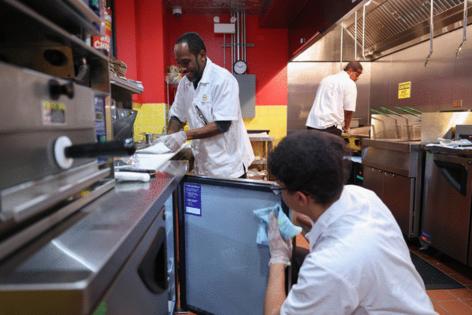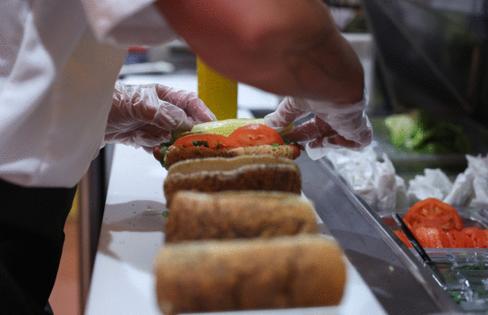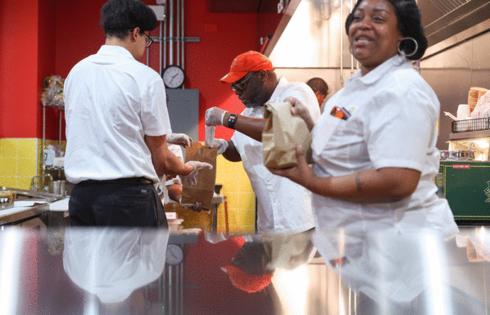Addiction treatment center opens Mac's Deli, a new Chicago restaurant staffed entirely by patients in recovery
Published in Lifestyles
CHICAGO -- Customers flocked to the bright red and yellow awning of Mac’s Deli on a cloudy Thursday afternoon, walking away with foil-wrapped workday lunches of warm Italian beef sandwiches and hot dogs.
Inside the new restaurant on Sangamon Street in the West Loop, the grills, fryers and registers were all manned by workers currently in recovery from drug addiction.
Preparing the French fries was Bryant Wynne, a 46-year-old South Side native whose first job was working as a fry person at Wendy’s. He has been a client of the Haymarket Center, a nonprofit treatment center for substance use disorders in the West Loop, for about a year and a half.
“(Haymarket Center) has helped people that may have fallen off track to get back on track,” said Wynne as he took his lunch break on Thursday. “Sometimes we gotta do what I call the reset. Once we do the reset, we get time enough to come to a place like this, get our lives back together again, and then go on. Then we can push play.”
Monday marked the grand opening of Mac’s Deli, a restaurant that Haymarket Center has opened in order to employ patients in recovery and provide them with job training. Mac’s Deli will be fully staffed by Haymarket Center clients, with the proceeds from its classic Chicago fare going toward the center’s initiatives.
The restaurant was built into the side of Haymarket Center’s building, just paces away from its other services. Mac’s Deli is designed to provide patients with substance use disorder an opportunity to return to the workforce within a supportive community centered around recovery, according to Haymarket Center President and CEO Dan Lustig.
“I don’t know of any other company that would put someone’s sobriety first, and that is the goal here,” Lustig said. “Haymarket’s client population is a population that tends to be homeless, highly transient, decades of a substance use disorder, decades of a mental health disorder, and decades of truncated primary care. … But we’ve moved them through treatment to stabilize those conditions and then get them employment.”
The new employees of Mac’s Deli were trained by the staff of iconic Chicago brand Vienna Beef, which has partnered with Haymarket Center to provide various Vienna Beef products that will be served up or sold at the restaurant.
Vienna Beef’s vice president of human resources, Rhonda Neville, wrote in an email to the Tribune that the meat products brand and Haymarket Center “are both Chicago institutions.”
“Vienna Beef enthusiastically supports Mac’s Deli because it’s so much more than a restaurant — it’s a bridge that will take people in recovery into the next, more prosperous phase of their life,” Neville wrote.
Wynne has received licenses in food service sanitation and food handling through his training with the Vienna Beef staff, which he said he hopes to apply to future jobs in the sector. He drew from his background at Wendy’s to teach other employees of Mac’s Deli how to prepare French fries that are “fresh and hot, with a little bit of salt.”
By Thursday of last week, the second day of an unpublicized soft opening, Mac’s Deli had already served hundreds of meals. The restaurant will be open Monday through Friday, from 11 a.m. to 7 p.m.
“It’s a great location, a lot of guys come in off their lunch break and stuff like that, and so this is a great thing for the community at large,” Wynne said.
The food services industry has historically been “one of the most forgiving industries” for the population served by Haymarket Center, according to Lustig, who noted that “they’ve always been around for people with second chances.”
So many clients have expressed interest in working at Mac’s Deli that there is currently a waiting list, he said. They plan to rotate the staff over time, with the current plan being to employ individuals from 90 days to six months, according to Lustig.
Melissa Crabtree, 33, arrived at Haymarket Center about five months ago from Peoria and is currently doing “a little bit of everything” in the kitchen of Mac’s Deli.
“They saved my life,” she said of Haymarket Center.
Crabtree used to work as a bread-maker at a restaurant, and recently received her food manager certification through Haymarket Center in advance of Mac’s Deli’s opening.
“I think it’s very good to help people with success, because it’s getting us ready to join the workforce again,” Crabtree said.
She has particularly appreciated working alongside others who are also in recovery, she said, as “it lets you know you’re not alone.”
Korey Lee, a 26-year-old from the Chicago suburbs, said he had been to two addiction treatment programs before entering Haymarket Center four months ago, but has “gotten more out of (Haymarket) than I have anywhere else.”
Lee worked at Culver’s for several years, and now prepares the hot dogs and burgers at Mac’s Deli. He plans to stay in food service going forward, as “just being able to do something that I’m prepared for while I’m focusing on my recovery is the biggest thing”
“I’m with people that are understanding of where I’m coming from,” he said while working in the kitchen on Thursday. “There hasn’t been any judgment that I’ve experienced in places before, and the camaraderie is really great.”
Workforce development programs like Mac’s Deli represent what used to be the “missing piece” in Haymarket Center’s programming, Lustig said.
Haymarket Center’s co-founder Monsignor Ignatius McDermott had a similar vision when he opened the center in 1975, wanting to create a barbershop in the facility’s basement in order to train clients in a profession, Lustig said.
This barbershop plan never came to fruition. Yet over the past few years, Haymarket Center has introduced a number of on-site employment opportunities for its recovering clients, including positions working in the center’s commercial kitchen — which serves approximately 900 meals a day — and as cashiers in the center’s pharmacy.
Most of Haymarket Center clients are homeless, Lustig said, meaning that such employment opportunities can allow them to “begin earning a living wage so that they can move into permanent housing.” Mac’s Deli nine current staff members are all residing in Haymarket Center’s recovery home, Lustig said.
“When they leave the recovery home and back to the community they want to go into, they can have a resume, they can have money that’s already built up for them, all under the guardrails of recovery,” Lustig said.
The federal grant funding for Mac’s Deli was secured by U.S. Sen. Dick Durbin, who was able to get a $600,000 earmark for the project.
“The Haymarket Center is leading the way with substance use disorder treatment and recovery programs that provide individuals in our community with dignity and a comprehensive care plan,” Durbin wrote in a statement to the Tribune. “I was glad to secure federal funding for this job training program to help improve the recovery path for individuals facing addiction.”
Lustig said that he hopes Mac’s Deli will become a “community staple,” particularly given the lower price point compared with other West Loop options. Yet he also urged people to consider the greater impact of their choice to dine at Mac’s Deli.
“I hope people see this as an opportunity, not just as a low-cost food choice,” Lustig said. “By supporting this deli, you’re actually directly helping a homeless person get back on their feet.”
©2024 Chicago Tribune. Visit at chicagotribune.com. Distributed by Tribune Content Agency, LLC.































Comments